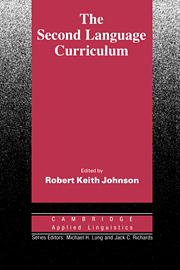Book contents
- Frontmatter
- Contents
- Contributors
- Series editors' preface
- Acknowledgements
- Overview
- I 1 CURRICULUM OVERVIEW
- I 2 CURRICULUM PLANNING
- Chapter 2 Syllabus design, curriculum development and polity determination
- Chapter 3 DES-IMPL-EVALU-IGN: an evaluator's checklist
- II ENDS/MEANS SPECIFICATION
- III PROGRAMME IMPLEMENTATION
- IV CLASSROOM IMPLEMENTATION
- V EVALUATION
- Bibliography
- Index
Chapter 2 - Syllabus design, curriculum development and polity determination
Published online by Cambridge University Press: 05 October 2012
- Frontmatter
- Contents
- Contributors
- Series editors' preface
- Acknowledgements
- Overview
- I 1 CURRICULUM OVERVIEW
- I 2 CURRICULUM PLANNING
- Chapter 2 Syllabus design, curriculum development and polity determination
- Chapter 3 DES-IMPL-EVALU-IGN: an evaluator's checklist
- II ENDS/MEANS SPECIFICATION
- III PROGRAMME IMPLEMENTATION
- IV CLASSROOM IMPLEMENTATION
- V EVALUATION
- Bibliography
- Index
Summary
Introduction
In this brief paper, I want to examine evidence which suggests that program innovation has not worked very well as a strategy for educational renewal. I contend that good programs are central to good education and that failures in program innovation are not as often failures of content as failures of contextual planning.
I want to draw distinctions between three types or levels of educational program planning. I label these levels
Syllabus design
Curriculum development
Polity determination
I propose that in the same sense that curriculum development is a contextually enlarged view of syllabus design so polity determination is a contextually enlarged view of curriculum development. I propose that examination of and planning within the relevant political context is critical to the success of any educational program and that program failures are often attributable to shortcomings in the sort of planning I call polity determination.
Finally, I propose a polity planning framework, which though necessarily limited in scope, has helped planners of three language education programs to become more aware of and be able to accommodate for those factors of a polito-pedagogical nature which often decide the success or failure of educational programs.
Success and failure
‘Innovations or revisions in programs have had only about 20 percent success rate in education.’ This conclusion from a large-scale study of educational change efforts has been supported by analyses from a wide variety of studies (Parish and Arrends, 1983).
- Type
- Chapter
- Information
- The Second Language Curriculum , pp. 24 - 34Publisher: Cambridge University PressPrint publication year: 1989
- 3
- Cited by



